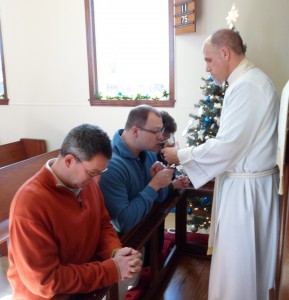
As on Epiphany Sunday 2013, so in every Divine Service: Pilgrim’s altar and its rail are open for communion to those who are members in good standing either of our congregation or of congregations with whom we are in fellowship. Guests and visitors who desire to commune are asked first to speak to the pastor well before the service.
Pilgrim Lutheran Church welcomes everyone to its worship services, especially to hear the reading and proclamation of the Gospel, which is the very power of God for salvation to everyone who believes (Romans 1:16). However, due to the sad division that exists in the world and even in Christianity, we cannot welcome everyone to the Lord’s Table. In keeping with the teaching of the Bible and so also of the Lutheran Confessions, Pilgrim practices what is called “closed communion”. While our altar and its rail are open for communion to those who are members in good standing either of our congregation or of congregations with whom we are in fellowship, our altar and its rail are closed for communion to those who either are not members in good standing or are members of a church with whom we are not in fellowship. Simply put, Lutheran altars are for Lutheran communicants only (what in 1872 was called the Akron Rule and, as restated in 1875, the Galesburg Rule). There are a number of reasons for this ancient practice, including our love and concern about the wellbeing of Pilgrim’s guests and visitors.
The Divinely inspired apostle St. Paul taught the Corinthian believers and all of us about the Lord’s Supper, including the danger of sinning against the Lord Jesus’s body and blood, which are present in, with, and under the bread and wine of the Lord’s Supper (see 1 Corinthians 10:14-22 and 11:17-34, but especially 11:27-29). Communicants are to recognize both the real, physical body of Christ present in the Sacrament, and they are also to recognize the ecclesiastical body of Christ in the Sacrament. The latter means that they recognize that the Sacrament is about more than the individual believer and Jesus: it is also about the individual believer being a part of the Church as the body of Christ gathered together, united, and identifiable by the Sacrament. As St. Paul says, an individual should examine himself or herself in connection with recognizing the body of Christ (1 Corinthians 11:28), but that does not mean he or she has the only responsibility for whether or not he or she communes. The church also has a responsibility: the people and especially the pastor, whom St. Paul calls the “steward of the mysteries” who strives for faithfulness (1 Corinthians 4:1-2). The Lutheran Confessions in a number of places (for example, the Apology of the Augsburg Confession, Article XV, paragraph 40) make clear that no one is communed at Lutheran altars until they are instructed, examined (both as to the content of their faith and the state of their repentance), and absolved (which individual absolution followed private confession).
As mentioned, Holy Communion is also an expression of unity in belief (for example, Acts 2:42; 1 Corinthians 11:26). Faith expresses itself in confession (Romans 10:9-10), and church membership and communion at a particular altar are forms of such confession of faith. If one who normally communes at an altar with a different confession of faith were to commune at a Lutheran altar, that person would be making two different confessions that are at best unclear, if not contradictory. (The same would be true for a faithful Lutheran person who would commune at the altar of either an unfaithful Lutheran or non-Lutheran church.) While we recognize both that the confessional Lutheran Church is the true church of Jesus Christ and that the church of Jesus Christ is not limited to the church of the Lutheran Confessions, we cannot ignore St. Paul’s statements about necessary divisions over doctrine and practice and how those divisions affect communion (see, for examples, 1 Corinthians 11:18-19; Romans 16:16-17).
Once closed communion was more commonly practiced among most Christian bodies. Many of those congregations or religious traditions that might claim to have a more open communion still draw a line but draw it in different places, perhaps suggesting communicants decide for themselves and only come forward if they are baptized and believe in the real, physical presence of Christ in the Sacrament. (Some call their practice “close” communion and simply allow greater or lesser degrees of “closeness”.) But, the Bible teaches one doctrine and calls for unity in that doctrine, and so the Lutheran Confessions refer to agreement not only on the Sacrament but on the Gospel and all its articles (for example, the Formula of Concord, Solid Declaration, Article X, paragraph 31). Moreover, when admission to the Lord’s Table is left solely to the individual, one can wonder whether a congregation really believes that Christ is really, physically present in the Sacrament—and so whether or not He really is present at that congregation’s Sacrament—since the congregation seems less concerned both about the unity of the Church and about the wellbeing of the communicant.
At Pilgrim we value your presence among us and love and care about our guests and visitors! So, we ask that those who desire to commune first speak to the pastor. Such a conversation can take place via email or telephone (note the contact information at right) or in person at least 15 minutes prior to the service (requests later than that may not be considered except in cases of an emergency, and note that waiting until after Bible Class does not allow sufficient time). If you are present at a communion service but should not commune, you are welcome to approach the rail for a blessing; come forward and kneel at the rail with those who are communing, but fold your arms over your heart and place your hands on the opposite shoulders.
As we seek only to be faithful to the Word of God, we do not intend the practice of closed communion to diminish our invitation for others to worship with us or to pass judgment on any individual. If you do not have a church home, we would be pleased for you eventually to join us. And, we pray that all will at least respect if not also understand the Church’s practice of closed communion, even as we pray for the day when all sad divisions over doctrine and practice will cease.
For more on Closed Communion, listen to Pilgrim’s special Closed Communion Study from September 28, 2014: Handout; Part 1; Part 2

